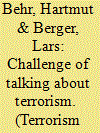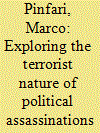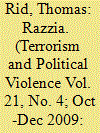| Srl | Item |
| 1 |
ID:
091266


|
|
|
|
|
| Publication |
2009.
|
| Summary/Abstract |
The Arab "hegemonic debate" on the causes of Islamist terrorism nurtures (pan-) Arab, anti-Western sentiments and delegitimizes criticism of the political status quo. The European Union's emphasis on multilateral means of conflict resolution and trade promotion leads to official pronouncements that barely address the Arab world's domestic problems, instead referring to international tensions such as the Arab-Israeli conflict as a particular cause of Islamist terrorism and the need for cooperation with Arab governments. By failing to challenge the official narratives of authoritarian Arab regimes the EU obstructs interests in the democratization of the region and the delegitimization of Islamist violence.
|
|
|
|
|
|
|
|
|
|
|
|
|
|
|
|
| 2 |
ID:
091269


|
|
|
|
|
| Publication |
2009.
|
| Summary/Abstract |
This paper reassesses the suggestion, advanced among others by David George, that the 1858 failed attentat by the Italian patriot Felice Orsini against Napoleon III can be considered as a paradigmatic instance of "terrorist assassination." Drawing on a new interpretation of the acts of Orsini's trial, the paper argues that Orsini's motivations were to a large degree "idiosyncratic"; however, it also discusses evidence suggesting that the significant collateral damage caused by the attack was, in Orsini's mind, one of the aims of the action and cannot be portrayed as unintended.
|
|
|
|
|
|
|
|
|
|
|
|
|
|
|
|
| 3 |
ID:
091270


|
|
|
|
|
| Publication |
2009.
|
| Summary/Abstract |
During the first half of 2006 the city of Sao Paulo suffered three series of violent attacks against the security forces, civilians, and the government. The violent campaign also included a massive rebellion in prisons and culminated in the kidnapping of a journalist and the broadcast of a manifesto from the criminal organization PCC threatening the police and the government. Right after, the main device used to contain organized crime in the prisons was declared unconstitutional. This episode represents a prototypical example of the use of media-focused terrorism by organized crime for projection into the political communication arena.
|
|
|
|
|
|
|
|
|
|
|
|
|
|
|
|
| 4 |
ID:
091268


|
|
|
|
|
| Publication |
2009.
|
| Summary/Abstract |
This article has two principal objectives: (1) to study the behavioral dimensions of Muslim prisoners which predict their Islamist radicalism and (2) to study whether the behavior manifested by them is higher in prisons with a greater concentration of Muslims and a higher presence of prisoners convicted for Islamist terrorism than in prisons with fewer Muslims and no convicted Islamist terrorists. We conclude that some Spanish prisons may provide favorable social environments for jihadist radicalism and that the questionnaire utilized is a useful diagnostic tool for evaluating the magnitude of this phenomenon.
|
|
|
|
|
|
|
|
|
|
|
|
|
|
|
|
| 5 |
ID:
091272


|
|
|
|
|
| Publication |
2009.
|
| Summary/Abstract |
The razzia, a tactic of swift and brutal raids used by the French military against recalcitrant tribes in Algeria in the 1840s, was a necessary step in modern military thought. At first glance the destructive and violent razzias stand in stark contrast to the constructive and non-violent bureaux arabes-an institutional ancestor of Provincial Reconstruction Teams. But both were developed in the same conflict and by the same men. These two innovations, this article argues, were also flipsides of the same coin: what today is called war "among the people." The razzia consequently appears as a necessary historic precursor for contemporary counterinsurgency doctrine.
|
|
|
|
|
|
|
|
|
|
|
|
|
|
|
|